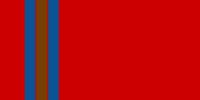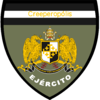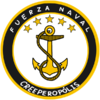Difference between revisions of "Surian Fishing War"
| Line 36: | Line 36: | ||
{{main|Rakeoian Civil War}} | {{main|Rakeoian Civil War}} | ||
| + | |||
| + | The end of the Rakeoian civil war saw the parliamentary government collapse, a [[Stratocratic Authority|military dictatorship]] secure power, and the rise of pseudo-legal [[Directory of Internal Affairs of Rakeo|paramilitary groups]]. A program of full independence, to be achieved through near complete isolationism, was instituted by [[Richard Cornell]] in 1956. Almost immediately the economy began to falter. A lack of coal imports plunged millions into darkness and stalled industries, fields previously used for profitable exports went fallow. As a consequence, remaining industries were pushed to become more productive. | ||
| + | |||
| + | As political turmoil damaged more energy dependent sectors, fishing maintained profitability, and a record number of fishing vessels were deployed. When the agriculture sector rebounded, the price of fish was reduced considerably. In response, fishers began to search for better waters. | ||
=== Sequoyan Frontier Wars === | === Sequoyan Frontier Wars === | ||
Revision as of 01:33, 24 September 2021
| Surian Fishing War | |||||||||
|---|---|---|---|---|---|---|---|---|---|
| |||||||||
| Belligerents | |||||||||
|
|
| ||||||||
| Commanders and leaders | |||||||||
|
|
| ||||||||
| Units involved | |||||||||
|
| 23x15px Unknown | ||||||||
| Strength | |||||||||
|
|
| ||||||||
| Casualties and losses | |||||||||
|
|
| ||||||||
The Surian Fishing War (Rakeoian: Suriana Fiŝkaptista Milito; Sequoyan: ᎤᎦᎾᏭᎢᏗᏢ ᎠᏑᏂᏙᎯ ᏓᏄᏩ; transliterated as: Uganawuiditlv Asunidohi Danuwa; Creeperian Spanish – Creeperian: Գփերրա դե Պեսծադո Սփրեթո; Creeperian Spanish – Iberic: Guerra de Pescado Sureño) was a conflict fought between the Surian nations of Sequoyah, Rakeo, and Creeperopolis between 1960 and 1962 in the Freemont Strait, Senvarian Sea, and Southern Ocean.
Contents
Background
Creeperian Civil War
Rakeoian Civil War
The end of the Rakeoian civil war saw the parliamentary government collapse, a military dictatorship secure power, and the rise of pseudo-legal paramilitary groups. A program of full independence, to be achieved through near complete isolationism, was instituted by Richard Cornell in 1956. Almost immediately the economy began to falter. A lack of coal imports plunged millions into darkness and stalled industries, fields previously used for profitable exports went fallow. As a consequence, remaining industries were pushed to become more productive.
As political turmoil damaged more energy dependent sectors, fishing maintained profitability, and a record number of fishing vessels were deployed. When the agriculture sector rebounded, the price of fish was reduced considerably. In response, fishers began to search for better waters.
Sequoyan Frontier Wars
Prelude
Order of battle
Sequoyan and Creeperian forces


When Creeperopolis joined the war, Chief Admiral José Mendoza Rivera dispatched the 5th Flotilla, stationed in San Pedro, to intervene in the conflict on behalf of Sequoyah. The flotilla was under the command of Admiral Adolfo Suárez Figueroa and consisted of one battleship, two heavy cruisers, three light cruisers, four destroyers, five submarines, one hospital ship, and twenty patrol ships, with 9,550 sailors aboard the ships.
- 5th Flotilla – Admiral Adolfo Suárez Figueroa
- 1st Fleet – Vice Admiral Armando Piñón Castro
- 1st Sector – Rear Admiral Enrique Larrañaga Gaitán
- BIC San José – Captain Gustavo López Fuentes (battleship)
- BIC La'Mariposa – Lieutenant Commander Jaime Zaldívar Casanova (destroyer)
- BIC DA 48 – Commander Isaías Flores Domínguez (submarine)
- BIC DA 77 – Commander Orlando Sandoval Ureña (submarine)
- BIC María – Lieutenant Commander Armando Linares Tejón (patrol ship)
- BIC Alberto – Lieutenant Commander Andrés Quijada Valdéz (patrol ship)
- BIC Guillermo – Lieutenant Commander Nicolás Galván García (patrol ship)
- BIC Alfonso – Lieutenant Commander Felipe Bermúdez Serrano (patrol ship)
- BIC Francisco – Lieutenant Commander Pedro Quesada Salinas (patrol ship)
- 2nd Sector – Rear Admiral Alexander Dávalos Hernández
- BIC San Pedro – Commander Miguel Suñer Huerta (heavy cruiser)
- BIC San Gerardo – Lieutenant Commander Adolfo Jiménez Hurtado (light cruiser)
- BIC Citalá – Lieutenant Commander Esteban Espinoza Regalado (destroyer)
- BIC DA 52 – Commander Leonardo Gutiérrez Carpio (submarine)
- BIC Orlando – Lieutenant Commander Juan Alba Morazán (patrol ship)
- BIC Pedro – Lieutenant Commander Fabián Alvarado Guerrero (patrol ship)
- BIC Esmeralda – Lieutenant Commander Emilio Álvarez Valdés (patrol ship)
- BIC Gloria – Lieutenant Commander Agustín Casanova Yagüe (patrol ship)
- BIC Gustavo – Lieutenant Commander Mario Hurtado Melléndez (patrol ship)
- 1st Sector – Rear Admiral Enrique Larrañaga Gaitán
- 2nd Fleet – Vice Admiral Pío Fuentes González
- 3rd Sector – Rear Admiral Jorge Obregón Salinas
- BIC San Salvador del Norte – Commander José Duarte Menéndez (heavy cruiser)
- BIC San Juan – Lieutenant Commander Gustavo Pérez Salinas (light cruiser)
- BIC Reyes – Lieutenant Commander Fidel Galván Hernández (destroyer)
- BIC DA 73 – Commander Emmanuel Ponce Castro (submarine)
- BIC Cassandra – Lieutenant Commander Carlos Ureña Fuentes (patrol ship)
- BIC Alexandra – Lieutenant Commander Humberto Carpio Flores (patrol ship)
- BIC Sofía – Lieutenant Commander José Juárez Juárez (patrol ship)
- BIC Rubí – Lieutenant Commander Manuel Enríquez Monterrosa (patrol ship)
- BIC Rita – Lieutenant Commander Martín Avendaño Salinas (patrol ship)
- 4th Sector – Rear Admiral Gonzalo Pérez Zaldívar
- BIC San Francisco – Lieutenant Commander Jesús Mori Buenaventura (light cruiser)
- BIC Anadesa – Lieutenant Commander Alberto Molina Figueroa (destroyer)
- BIC DA 83 – Commander Enrique Valdéz Quijada (submarine)
- BIC Mateo Figueroa Salinas – Commander Alfredo Carranza Regalado (hospital ship)
- BIC Augusto – Lieutenant Commander Roberto Espiga Araujo (patrol ship)
- BIC Lenora – Lieutenant Commander Bernardo Barrie Ulloa (patrol ship)
- BIC Enrique – Lieutenant Commander Porfirio Delgado Reyes (patrol ship)
- BIC Angelina – Lieutenant Commander José Gutiérrez Molina (patrol ship)
- BIC Hernando – Lieutenant Commander Javíer Nariño Malespín (patrol ship)
- 3rd Sector – Rear Admiral Jorge Obregón Salinas
- 1st Fleet – Vice Admiral Armando Piñón Castro
Rakeoian forces
Conflict
Aftermath
International positions
Casualties and losses
Sequoyan and Creeperian casualties
Rakeoian casualties
Legacy
See also
- Ajaki–Reykani War, a similar war over natural resources






